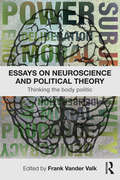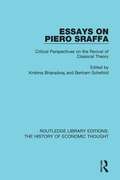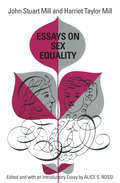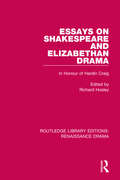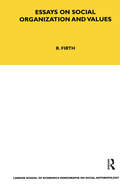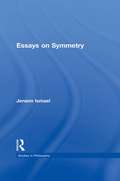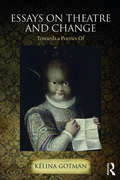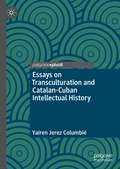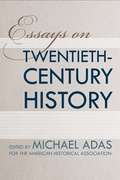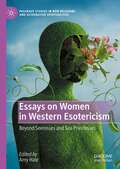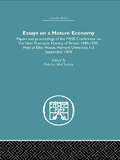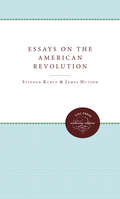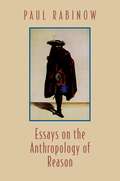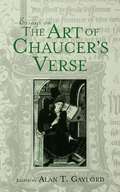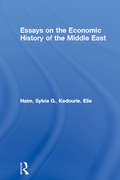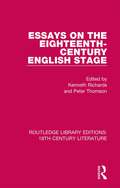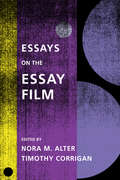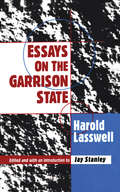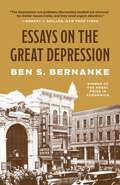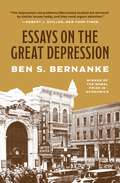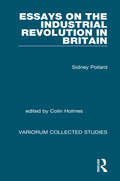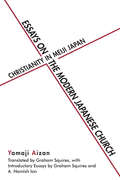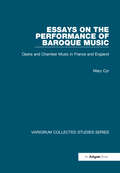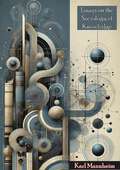- Table View
- List View
Essays on Neuroscience and Political Theory: Thinking the Body Politic
by Frank Vander ValkThe past 20 years have seen increasingly bold claims emanating from the field of neuroscience. Advances in medical imaging, brain modelling, and interdisciplinary cognitive science have forced us to reconsider the nature of social, cultural, and political activities. This collection of essays is the first to explore the relationship between neuroscience and political theory, with a view to examining what connections can be made and which claims represent a bridge too far. The book is divided into three parts: Part I: places neuroscience as a social and political practice into historical context Part II: weaves together the insights from contemporary neuroscience with the wisdom of major figures in the history of political thought Part III: considers how neuroscience can inform contemporary debates about a range of issues in political theory This work brings together scholars who are sceptical about the possibility of integrating neuroscience and political theory with proponents of a neuroscience-informed approach to thinking about political and social life. The result is a timely and wide-ranging collection of essays about the role that our brain might play in the life of the body politic. It should be essential reading for all those with an interest in the cutting edge of political theory.
Essays on Northeastern North America, 17th & 18th Centuries
by John G. ReidIn examining the history of northeastern North America in the seventeenth and eighteen centuries, it is important to take into account diverse influences and experiences. Not only was the relationship between native inhabitants and colonial settlers a defining characteristic of Acadia/Nova Scotia and New England in this era, but it was also a relationship shaped by wider continental and oceanic connections. The essays in this volume deal with topics such as colonial habitation, imperial exchange, and aboriginal engagement, all of which were pervasive phenomena of the time. John G. Reid argues that these were complicated processes that interacted freely with one another, shaping the human experience at different times and places. Northeastern North America was an arena of distinctive complexities in the early modern period, and this collection uses it as an example of a manageable and logical basis for historical study. Reid also explores the significance of anniversary observances and commemorations that have served as vehicles of reflection on the lasting implications of historical developments in the early modern period. These and other insights amount to a fresh perspective on the region and offer a deeper understanding of North American history.
Essays on Piero Sraffa: Critical Perspectives on the Revival of Classical Theory (Routledge Library Editions: The History of Economic Thought)
by Bertram Schefold Krishna BharadwajThe papers collected in this book, first published in 1990, represent the edited proceedings of a conference held to celebrate the 25th anniversary of the publication of Piero Sraffa’s Production of Commodities by Means of Commodities. In arranging the conference, and subsequently during the editing of the papers, great care has been taken to invite scholars of different schools of thought to contribute. The result of this collection of ideas has resulted in a most promising critique and provides an extensive alternative to modern Neo-Classical theory, of interest to all students of economic thought.
Essays on Sex Equality
by John Stuart Mill Alice S. Rossi Harriet Taylor MillThis volume brings together for the first time all the writings of John Stuart Mill and Harriet Taylor Mill on equality between the sexes, including John Stuart Mill's The Subjection of Women, a classic in the history of the women's rights movement since its publication one hundred years ago. Also contained in this volume is a major interpretative essay by Alice S. Rossi on Mill and Harriet Taylor which describes and analyzes their long personal and intellectual relationship.
Essays on Shakespeare and Elizabethan Drama: In Honour of Hardin Craig (Routledge Library Editions: Renaissance Drama #Vol. 5)
by Richard HosleyThe twenty-eight essays of this collection, first published in 1962, are the work of distinguished British, Canadian, and American scholars. The essays range widely over the field of Elizabethan drama, concentrating attention on Shakespeare and Marlowe but not neglecting earlier dramatists such as Kyd and Greene or later ones such as Heywood and Massinger. Among the general topics treated are the staging of the interludes, intrigue in Elizabethan tragedy, and Jacobean stage pastoralism. This title will be of interest to students of English literature.
Essays on Social Organisation and Values (London School Of Economics Monographs On Social Anthropology Ser. #No. 28)
by Raymond FirthIn this volume Professor Firth has brought together and commented upon a number of his papers on anthropological subjects published over the last thirty years. All these essays relate in different ways to his continuing interest in the study of social process, especially in the significance within a social context of individual choice and decision. Although some specialist studies are included, e.g. the group of papers dealing with the Polynesian island of Tikopia, the main themes of the book are broad ones and there are important general essays on such topics as social change; social structure and organization; modern society in relation to scientific and technological progress; and the study of values, mysticism, and religion by anthropologists. There is also a hitherto unpublished chapter on anthropology as a developing science.
Essays on Symmetry
by Jenann IsmaelDrawing from physics and philosophical debates, Ismael combines a set of essays on the time worn debate of symmetry from both fields.
Essays on Theatre and Change: Towards a Poetics Of
by Kélina GotmanIf theatre is a way of seeing, an event onstage but also a fleeting series of moments; not a copy or double but more vitally metamorphosis, transformation, and change, how might we speak to – and of – it? How do we envision and frame a fluid reality that moves faster than we can write? Arranged over two parts, 'Figurations' and 'Translations', Essays on Theatre and Change reflects on the animal, history, doubling, translation, and the performative potential of writing itself. Each fictocritical essay weaves between voices, genres and contexts to consider what theatre might be, offering a 'partial object' rather than a complete theory. Leaving the page radically open to its reader, Essays on Theatre and Change is a dazzling, multi-lensed account of what it is to think and write on theatre.
Essays on Transculturation and Catalan-Cuban Intellectual History
by Yairen Jerez ColumbiéThis book examines the cultural production of Catalan intellectuals in Cuba through a reading of texts and journeys that show the contrapuntal relationship between transcultural identities and narratives of nationhood. Both the concept of transculturation and its instrumentalization to tame conflict within nationalist projects are problematic. By uncovering and examining the contradictions between the fluid character of identities in the Cuban context of the first half of the twentieth century and nationalist discourses, within both the Catalanist community of Havana and Cuban society, this book joins wider debates about identities.
Essays on Twentieth-Century History
by Michael AdasIn the sub-field of world history, there has been a surprising paucity of thinking and writing about how to approach and conceptualize the long twentieth century from the 1870s through the early 2000s. The historiographic essays collected inEssays on Twentieth Century Historywill go a long way to filling that lacuna. Each contribution covers a key theme and one or more critical sub-fields in twentieth century global history. Chapters address migration patterns, the impact of world wars, transformations in gender and urbanization, as well as environmental transitions. All are written by leading historians in each of the sub-fields represented, and each is intended to provide an introduction to the literature, key themes, and debates that have proliferated around the more recent historical experience of humanity. Essays on Twentieth Century Historyis an essential collection for scholars and students who wish to understand the recent past. Contributors include: Paul Edwards, Carl J. Guarneri, Gabrielle Hecht, Adam McKeown, John H. Morrow, Jr. , Jose C. Moya, Jean H. Quataert, Bonnie Smith, Howard Spodek, Robin Tucker, and the editor.
Essays on Women in Western Esotericism: Beyond Seeresses and Sea Priestesses (Palgrave Studies in New Religions and Alternative Spiritualities)
by Amy HaleThis book is the first collection to feature histories of women in Western Esotericism while also highlighting women’s scholarship. In addition to providing a critical examination of important and under researched figures in the history of Western Esotericism, these fifteen essays also contribute to current debates in the study of esotericism about the very nature of the field itself. The chapters are divided into four thematic sections that address current topics in the study of esotericism: race and othering, femininity, power and leadership and embodiment. This collection not only adds important voices to the story of Western Esotericism, it hopes to change the way the story is told.
Essays on a Mature Economy: Papers and Proceedings on the New Economic History of Britain 1840-1930 (Quantitative Studies In History Ser. #1522)
by Deirdre McCloskeyThese unique papers were originally read at a conference on the new economic history of Britain at Harvard in 1970, and each is accompanied by a summary of the discussion that followed it. The participants of the conference represented a broad range of scholars from both sides of the Atlantic. The first eleven papers deal with a variety of topics covering a period from 1840 to the 1920s. They focus on the performance of the British economy, and especially its businessmen, during the time of Britain's industrial maturity and relative decline. The papers and discussions reached a novel conclusion tha, contrary to commonly held opinion, the British economy performed well and that British businessmen were not lacking in entrepreneurial vigour compared with their German or American counterparts. But even more important for British historiography than this finding was the demonstration that economic and statistical methods can be applied successfully to the study of economic history. The papers in the concluding section discuss the origins and development of the new economic history and show that, as a substantial supplement to work along more traditional lines, its methods and application are both desirable and possible. This collection serves as an interesting report of research into a key period in British history, and also as a useful introductory account of the new economic history in the United Kingdom. This book was first published in 1971.
Essays on the American Revolution (Published by the Omohundro Institute of Early American History and Culture and the University of North Carolina Press)
by James H. Hutson Stephen G. KurtzThese eight original essays by a group of America's most distinguished scholars include the following themes: the meaning and significance of the Revolution; the long-term, underlying causes of the war; violence and the Revolution; the military conflict; politics in the Continental Congress; the role of religion in the Revolution; and the effect of the war on the social order. This is the product of the celebrated Symposium on the American Revolution held in 1971 by the institute.Originally published 1973.A UNC Press Enduring Edition -- UNC Press Enduring Editions use the latest in digital technology to make available again books from our distinguished backlist that were previously out of print. These editions are published unaltered from the original, and are presented in affordable paperback formats, bringing readers both historical and cultural value.
Essays on the Anthropology of Reason
by Paul RabinowThis collection of essays explains and encourages new reflection on Paul Rabinow's pioneering project to anthropologize the West. His goal is to exoticize the Western constitution of reality, emphasize those domains most taken for granted as universal, and show how their claims to truth are linked to particular social practices, hence becoming effective social forces. He has recently begun to focus on the core of Western rationality, in particular the practices of molecular biology as they apply to our understanding of human nature. This book moves in new directions by posing questions about how scientific practice can be understood in terms of ethics as well as in terms of power. The topics include how French socialist urban planning in the 1930s engineered the transition from city planning to life planning; how the discursive and nondiscursive practices of the Human Genome Project and biotechnology have refigured life, labor, and language; and how a debate over patenting cell lines and over the dignity of life required secular courts to invoke medieval notions of the sacred. Building on an ethnographic study of the invention of the polymerase chain reaction--which enables the rapid production of specific sequences of DNA in millions of copies Rabinow, in the final essay, reflects in dialogue with biochemist Tom White on the place of science in modernity, on science as a vocation, and on the differences between the human and natural sciences.
Essays on the Art of Chaucer's Verse (Basic Readings in Chaucer and His Time #3)
by Alan T. GaylordThese fifteen essays, four of them commissioned for this volume, along with a discursive introduction which sets each essay into place and comments on its distinctive features, represent a gathering never before attempted: a symposium on Chaucer's craft that concentrates on his poetic forms, his rhythms, his riming, his versification, his prosody. In his seminal essay, Scanning the Prosodists, Alan Gaylord (the editor of this volume) had asked: To show how Chaucer moves, and in moving, moves us: is that not what the study of his prosody should do? Should it not identify a pattern of sounds in motion, a regular and expressive succession which is part of the order of verse and a major component of its effectiveness? In the two decades that followed that essay, a number of distinguished scholars provided a variety of answers for such questions, arising from the authors' work as metrical theorists, or editors of medieval verse, or literary historians, or critics -- but in every case, such work connected to the initiatives and discoveries of the classroom. The best written and most useful of those essays, by recognized authorities in their fields, have been included in this volume. The volume will be of use to the advanced student of Chaucer and medieval poetry, and to the teacher interested in identifying, explaining, and bringing to life the patterns of sound and sense in Chaucer's verse. The extensive master Bibliography for the whole volume comprises a library of references which will have been reviewed and discussed in the essays.
Essays on the Economic History of the Middle East
by Elie Kedourie Sylvia G. HaimPublished in 1988, Essays on the Economic History of the Middle East is a valuable contribution to the field of Middle Eastern Studies.
Essays on the Eighteenth-Century English Stage (Routledge Library Editions: 18th Century Literature)
by Peter Thomson Kenneth R. RichardsThe eighteenth century produced more inventive actors than fine dramatists, and it displayed its actors to increasing advantage as theatre management became more expert, and stage design more ambitious. First published in 1972, the eleven papers collected in The Eighteenth-Century English Stage, originally read at a Manchester University Symposium in July 1971, follow this historical emphasis. Two papers are centred on dramatists, four on actors, three on managers, and two on designers. Malcolm Kelsall analyses Steele’s debt to Terence, using his classical scholarship as illuminatingly as Edgar Roberts uses his musical scholarship in writing about the songs in Fielding’s plays. George Taylor compares and evaluates a number of theories of acting, and speculates on the likely relevance of the best-known books on rhetoric, whilst Kathleen Barker, Arnold Hare, and David Rostron consider the work of individual actors – Powell, Cooke, and John Kemble. Theatre managers are represented by John Rich in Paul Sawyer’s sympathetic account, Thomas Harris, who is given new life in the recent researches of Cecil Price, and Stephen Kemble, fixed by Kenneth Robinson in canny control of the Newcastle theatre circuit. Finally, Graham Barlow reaches some controversial conclusions about the dimensions of the Theatre Royal, Drury Lane, by subjecting Thornhill’s sketches to a practising designer’s statistical examination, and Sybil Rosenfeld carries a stage further her pioneering work on eighteenth-century scene-painting and design. The two last are attractively illustrated by 8 pages of plates. This book’s particular value lies in its bringing together several simply presented but deeply informed explorations of often neglected aspects of the eighteenth-century theatre. The papers, with their general sense of enthusiasm and concern for their subject, will interest all students of the eighteenth century, and theatre enthusiasts in particular.
Essays on the Essay Film (Film and Culture Series)
by Timothy Alter Nora M. CorriganThe essay—with its emphasis on the provisional and explorative rather than on definitive statements—has evolved from its literary beginnings and is now found in all mediums, including film. Today, the essay film is, arguably, one of the most widely acclaimed and critically discussed forms of filmmaking around the world, with practitioners such as Chris Marker, Hito Steyerl, Errol Morris, Trinh T. Minh-ha, and Rithy Panh. Characteristics of the essay film include the blending of fact and fiction, the mixing of art- and documentary-film styles, the foregrounding of subjective points of view, a concentration on public life, a tension between acoustic and visual discourses, and a dialogic encounter with audiences.This anthology of fundamental statements on the essay film offers a range of crucial historical and philosophical perspectives. It provides early critical articulations of the essay film as it evolved through the 1950s and 1960s, key contemporary scholarly essays, and a selection of writings by essay filmmakers. It features texts on the foundations of the essay film by writers such as Hans Richter and André Bazin; contemporary positions by, among others, Phillip Lopate and Michael Renov; and original essays by filmmakers themselves, including Laura Mulvey and Isaac Julien.
Essays on the Garrison State
by Harold Lasswell Jay StanleyLasswell introduced the developmental construct of the garrison state as an antithesis of the civilian state more than fifty years ago, suggesting it would evolve from the industrial state in response to technical achievement. His original thoughts on the garrison state construct remain applicable today. This important volume brings together four major essays written by Lasswell.
Essays on the Great Depression
by Ben S. BernankeFrom the Nobel Prize–winning economist and former chair of the U.S. Federal Reserve, a landmark book that provides vital lessons for understanding financial crises and their sometimes-catastrophic economic effectsAs chair of the U.S. Federal Reserve during the Global Financial Crisis, Ben Bernanke helped avert a greater financial disaster than the Great Depression. And he did so by drawing directly on what he had learned from years of studying the causes of the economic catastrophe of the 1930s—work for which he was later awarded the Nobel Prize. Essays on the Great Depression brings together Bernanke&’s influential work on the origins and economic lessons of the Depression, and this new edition also includes his Nobel Prize lecture.
Essays on the Great Depression
by Ben S. BernankeFrom the Nobel Prize–winning economist and former chair of the U.S. Federal Reserve, a landmark book that provides vital lessons for understanding financial crises and their sometimes-catastrophic economic effectsAs chair of the U.S. Federal Reserve during the Global Financial Crisis, Ben Bernanke helped avert a greater financial disaster than the Great Depression. And he did so by drawing directly on what he had learned from years of studying the causes of the economic catastrophe of the 1930s—work for which he was later awarded the Nobel Prize. This influential work is collected in Essays on the Great Depression, an important account of the origins of the Depression and the economic lessons it teaches.
Essays on the Industrial Revolution in Britain (Variorum Collected Studies)
by Sidney PollardThis volume has three main themes. First, there is the concept of the Industrial Revolution and its main characteristics, and the author defends both the term and the notions behind it against attempts to play down their significance. A particular interest is the comparison of what happened to Britain with similar processes in other European countries. The second theme is the set of problems facing the early entrepreneurs and managers. Their difficulties, as pioneers in the economic as well as the social sphere, are often underrated, and are here explored in detail. Last, there is an emphasis on the characteristic feature of industrialisation as a regional phenomenon, and on the significance of particular regions in the entire process. All three themes have called forth extended debate, in which these essays have played an important part.
Essays on the Modern Japanese Church: Christianity in Meiji Japan (Michigan Monograph Series in Japanese Studies #27)
by Aizan YamajiEssays on the Modern Japanese Church (Gendai Nihon kyokai shiron), published in 1906, was the first Japanese-language history of Christianity in Meiji Japan. Yamaji Aizan’s firsthand account describes the reintroduction of Christianity to Japan—its development, rapid expansion, and decline—and its place in the social, political, and intellectual life of the Meiji period. Yamaji’s overall argument is that Christianity played a crucial role in shaping the growth and development of modern Japan. Yamaji was a strong opponent of the government-sponsored “emperor-system ideology,” and through his historical writing he tried to show how Japan had a tradition of tolerance and openness at a time when government-sponsored intellectuals were arguing for greater conformity and submissiveness to the state on the basis of Japanese “national character.” Essays is important not only in terms of religious history but also because it highlights broad trends in the history of Meiji Japan. Introductory chapters explore the significance of the work in terms of the life and thought of its author and its influence on subsequent interpretations of Meiji Christianity.
Essays on the Performance of Baroque Music: Opera and Chamber Music in France and England (Variorum Collected Studies)
by Mary CyrIn this collection of essays Mary Cyr explores some of the written and unwritten performance conventions that applied to French and English music of the 17th and early 18th centuries. Using composers' own notations, marks added by 18th-century performers, historical treatises, and pictorial evidence, she investigates both vocal and instrumental genres, including opera, cantatas, instrumental chamber music, and solo music for the viol and violin. Some of the performance conventions remain controversial, such as the use of gesture by the French opera chorus, and others are still little-known, such as the use of the double bass for rhythmic and harmonic support in early 18th-century French opera. As many of these essays demonstrate, French Baroque music allowed performers a wider latitude of nuance and expression than is often assumed today. The essays in this volume will be of particular interest to scholars and performers who are interested in adopting a historically-informed approach to performing music by Henry Purcell, Élisabeth-Claude Jacquet de La Guerre, Jean-Philippe Rameau, and their contemporaries. Several studies also deal with attributions, sources, and the discovery of a cantata by Rameau.
Essays on the Sociology of Knowledge
by Karl MannheimEssays on the Sociology of Knowledge by Karl Mannheim is a foundational work in the field of sociology, offering profound insights into how human thought, knowledge, and ideology are shaped by social contexts. Originally published in the early 20th century, Mannheim’s essays explore the relationship between knowledge and society, challenging the notion that ideas exist independently of the social environment in which they arise. His work remains essential for students and scholars interested in the sociology of knowledge, philosophy, and political thought.Mannheim argues that all knowledge is socially conditioned, meaning that individuals and groups produce ideas that reflect their specific social position and historical context. He introduces the concept of ideology and utopia—terms that describe, respectively, the ways dominant groups seek to maintain the status quo through their ideas and how marginalized or revolutionary groups generate transformative visions of the future. This dynamic interaction between knowledge, power, and social structure lies at the heart of Mannheim’s analysis.The essays in this collection address key questions about objectivity, the role of intellectuals, and the limits of scientific knowledge in understanding society. Mannheim examines how worldviews, or Weltanschauungen, differ across classes and social groups, demonstrating that no perspective is neutral. Instead, all forms of thought must be seen as part of broader social processes that influence and constrain them.Essays on the Sociology of Knowledge offers readers a way to critically examine how ideas function within society and how individuals can better understand their own thinking as shaped by historical and cultural forces. Mannheim’s insights have had a lasting impact on sociology, philosophy, and political theory, continuing to inform debates on ideology, power, and the nature of truth. This work remains an essential read for those seeking to understand the interplay between knowledge, society, and power.
